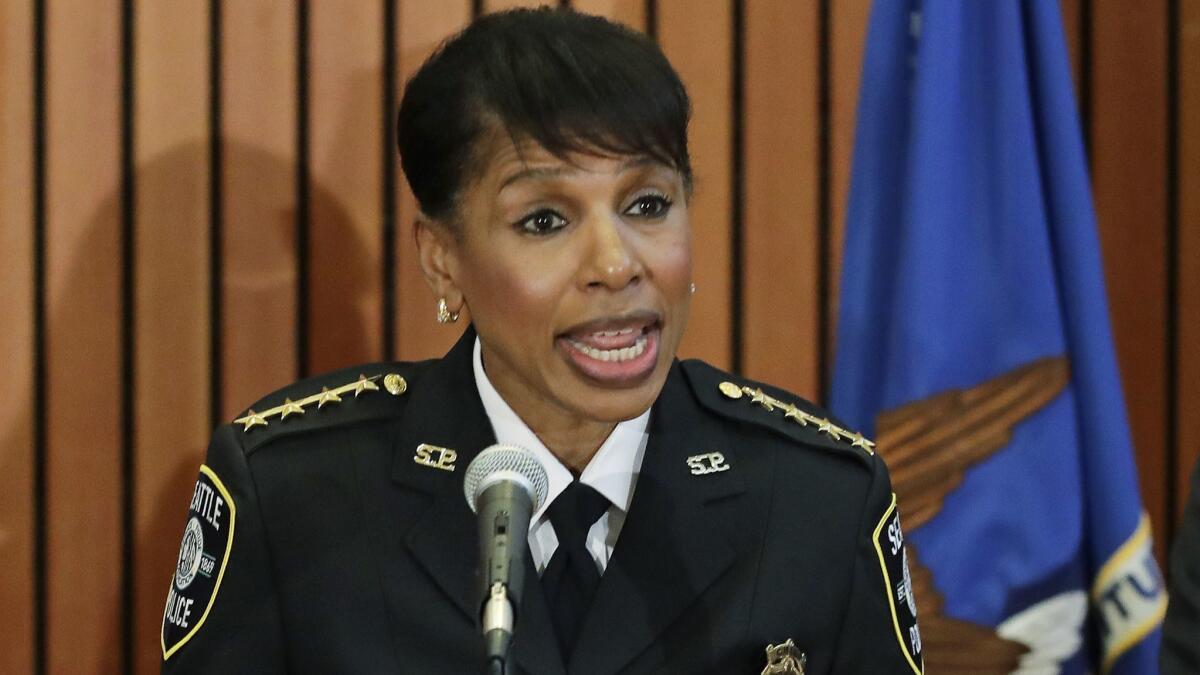Black women now lead police forces in two of America’s whitest cities, Seattle and Portland

- Share via
Reporting from Seattle — Seattle, like Portland, now has a black female chief of police. Danielle Outlaw, 41, a former Oakland police commander, has been the Portland Police Bureau’s chief about 10 months, while Carmen Best, 53, a 26-year veteran of the Seattle Police Department, was sworn in this week.
Both appointments had an air of promise about them as two of America’s most liberal, and whitest, big cities — Seattle is 70% white; Portland, 76% — sought solutions to the racial divisions and questionable shootings that plague U.S. communities.
Seattle also is hoping to end six years of federally mandated oversight brought on by past civil rights violations, and Best is a semi-expert on the issue. Portland, meanwhile, has been a revolving door for police chiefs in hot water. Outlaw replaced a chief who retired after accidentally wounding a fellow camper during a hunting and beer-drinking outing, then lied about it.
But to hire the chiefs they wanted, the two cities’ new mayors used some unorthodox arm twisting to break through century-old racial and gender barriers. The Seattle department, with about 1,400 sworn personnel today, was founded in 1886, while the Portland Police Bureau, now with roughly 1,000 officers, dates to 1870. No permanent chiefs of either city had been women of color.
Portland first-term Mayor Ted Wheeler said he wanted to change that. He essentially hand-picked Outlaw after candidly warning chief candidates in an employment ad they would have to deal with the Rose City’s history of racism.
“The State of Oregon and its largest city, Portland, share a history of legally sanctioned systemic racism with legally enforced exclusionary practice,” the job posting emphasized in its opening paragraph.
(African Americans were barred by state law from living in Oregon until 1926, and Ku Klux Klan members were welcome. Even today, Census Bureau statistics show, Oregon’s black population is just over 70,000, constituting less than 2% of state residents.)
“Given this history, the successful candidate must demonstrate the capacity and commitment to expand on existing strategies to improve relationships with and service provision to Portland’s communities of color, ensuring that equity is a bedrock of policing in Portland,” the job posting said.
Though the police union complained about the mayor’s implication “that the Police Bureau and its members have supported a racist culture in the city,” new chief Outlaw agreed with Wheeler at her swearing-in ceremony in October.
“We cannot effectively address crime reduction and community engagement and inclusion or organizational excellence through an equity and inclusion lens if we ignore our history,’’ she said. “How can we begin the healing process without first acknowledging what was?”
In Seattle, former U.S. Atty. Jenny Durkan, who in January became the city’s first lesbian mayor, immediately appointed Best acting chief to replace the recently departed Kathleen O’Toole. Durkan made no secret about wanting Best to become permanent chief.
But it took two tries by the mayor-in-training to get there.
When a trio of finalists were announced in May, Best didn’t make the cut. The selection committee, appointed by the mayor, decided an outsider was needed to continue its use-of-force reforms.
Best, upset but cool, wished the finalists success, adding that “each of them should know how fortunate they will be to lead officers who have a commitment to public safety and reform.”
A community uproar of support for Best ensued, with critics claiming it was a secretly decided, race-based decision. Harriett Walden, a leader of a citizen’s police commission, said the process was flawed, and “we know it was anything but the black woman.”
That was followed by Durkan’s sly move: One of the three finalists — former Pittsburgh Police Chief Cameron McLay — was offered a consulting job with the department and dropped out of the chiefs pageant.
The committee met anew with the unhappy mayor, presented its new finalists — Ely Reyes, assistant chief in Austin, Texas; Eddie Frizell, a former deputy chief in Minneapolis; and Carmen Best.
Best was the winner, the mayor announced to the surprise of no one.
The new chief got the City Council’s unanimous approval this week. She spent Monday meeting with officials and the community at City Hall, trailed by a crowd of supporters. After the council’s 8-0 vote, she seemed slightly dazed. “I had no idea I had so much support in the community,” she said.
To underscore that and ensure others get their chance to cheer Best on, the city arranged no fewer than three swearing-in ceremonies for the new chief this week.
Anderson is a special correspondent.
More to Read
Sign up for Essential California
The most important California stories and recommendations in your inbox every morning.
You may occasionally receive promotional content from the Los Angeles Times.










